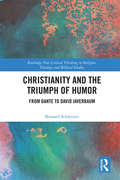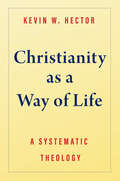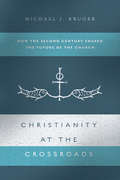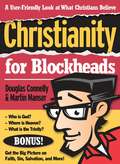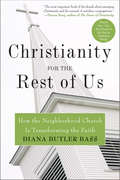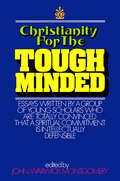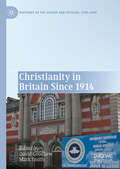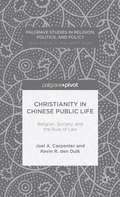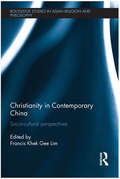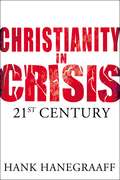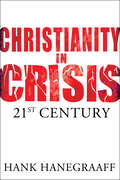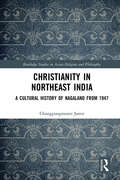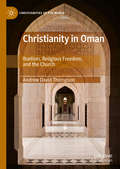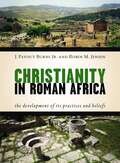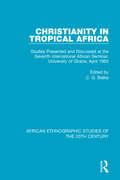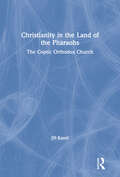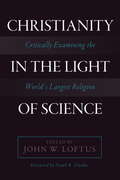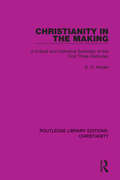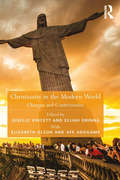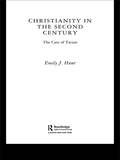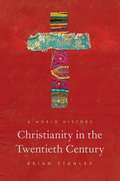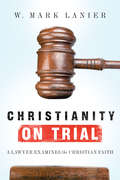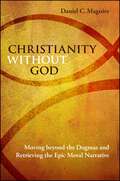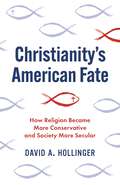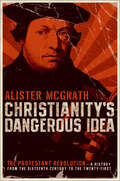- Table View
- List View
Christianity and the Triumph of Humor: From Dante to David Javerbaum (Routledge New Critical Thinking in Religion, Theology and Biblical Studies)
by Bernard SchweizerThis book traces the development of religious comedy and leverages that history to justify today’s uses of religious humor in all of its manifestations, including irreverent jokes. It argues that regulating humor is futile and counterproductive, illustrating this point with a host of comedic examples. Humor is a powerful rhetorical tool for those who advocate and for those who satirize religious ideals. The book presents a compelling argument about the centrality of humor to the story of Western Christianity’s cultural and artistic development since the Middle Ages, taking a multi-disciplinary approach that combines literary criticism, religious studies, philosophy, theology, and social science. After laying out the conceptual framework in Part 1, Part 2 analyzes key works of religious comedy across the ages from Dante to the present, and it samples the breadth of contemporary religious humor from Brad Stine to Robin Williams, and from Monty Python to South Park. Using critical, historical, and conceptual lenses, the book exposes and overturns past attempts by church authorities, scholars, and commentators to limit and control laughter based on religious, ideological, or moral criteria. This is a unique look into the role of humor and comedy around religion. It will, therefore, be of great interest to scholars of Religious Studies, Humor Studies, and the Sociology of Religion.
Christianity as a Way of Life: A Systematic Theology
by Kevin W HectorFocusing on Christianity’s core practices, a leading theologian imagines Christianity as a way of life oriented toward wisdom In this book, Kevin W. Hector argues that we can understand Christianity as a set of practices designed to transform one’s way of perceiving and being in the world. Hector examines practices that reorient us to God (imitation, corporate singing, eating together, friendship, and likemindedness), that transform our way of being in the world (prayer, wonder, laughter, lament, and vocation), and that reshape our way of being with others (benevolence, looking for the image of God in others, forgiveness, and activism). Taken together, the aim of these practices is to transform one’s way of perceiving and acting in the face of success and failure, risk and loss, guilt and shame, love, and loss of control. These transformations can add up to a transformation of one’s very self. To make sense of Christianity as a way of life, in turn, these practices must be understood within the context of Christian beliefs about sin, Jesus, redemption, and eternal life. Understanding them thus requires a systematic theology, which Hector offers in this clear-eyed, ambitious, and elegant interpretation of the Christian tradition.
Christianity at the Crossroads: How the Second Century Shaped the Future of the Church
by Michael J. KrugerThe Gospel Coalition Christianity at the Crossroads
Christianity for Blockheads: A User-Friendly Look at What Christians Believe
by Martin H. Manser Douglas ConnellyDo you think the twelve apostles include Sneezy, Sleepy, and Dopey? Genesis is an English rock band? Bread and wine is the first course? You need Christianity for Blockheads—the user-friendly guide to making this mysterious faith called Christianity easier to understand. In witty Blockheads tradition, this latest book in the series unites a fun, clear, easy-reading style with a thorough introduction and exploration into Christian theology. Covering all the must-know teachings of the Christian faith and tying each one to key Bible passages, the concise, catchy, jargon-free style will appeal to a broad range of readers. You don’t have to be a theologian to navigate the territory of Christian belief, but it helps to have a map. Here it is. Both Christians and curious non-Christians looking for clear and reliable explanations of the Christian faith will find them inside. Christianity for Blockheads helps you: • Make sense of key Bible passages • Discover what well-known scholars say about the main tenets of Christianity • Learn interesting facts and insights on particular biblical themes • Familiarize yourself with the Christian perspective on hot issues such as the end times, baptism, and speaking in tongues • Dig deeper into resources for further study • Walk the walk by demonstrating how the Christian message applies to contemporary living
Christianity for the Rest of Us: How the Neighborhood Church Is Transforming the Faith
by Diana Butler BassFor decades the accepted wisdom has been that America's mainline Protestant churches are in decline, eclipsed by evangelical mega-churches. Church and religion expert Diana Butler Bass wondered if this was true, and this book is the result of her extensive, three-year study of centrist and progressive churches across the country. Her surprising findings reveal just the opposite--that many of the churches are flourishing, and they are doing so without resorting to mimicking the mega-church, evangelical style. Christianity for the Rest of Us describes this phenomenon and offers a how-to approach for Protestants eager to remain faithful to their tradition while becoming a vital spiritual community. As Butler Bass delved into the rich spiritual life of various Episcopal, United Methodist, Disciples of Christ, Presbyterian, United Church of Christ, and Lutheran churches, certain consistent practices--such as hospitality, contemplation, diversity, justice, discernment, and worship--emerged as core expressions of congregations seeking to rediscover authentic Christian faith and witness today. This hopeful book, which includes a study guide for groups and individuals, reveals the practical steps that leaders and laypeople alike are taking to proclaim an alternative message about an emerging Christianity that strives for greater spiritual depth and proactively engages the needs of the world.
Christianity for the Tough Minded: Essays Written by a Group of Young Scholars Who are Totally Convinced That A Spiritual Commitment Is Intellectually Defensible
by John Warwick MontgomeryA collection of 24 essays that provide wide-ranging evidence for the intellectual respectability of the Christian faith, along with critiques of Bertrand Russell, Julian Huxley, Herbert Marcuse, Eric Hoffer, Franz Kafka, Hermann Hesse, and Ayn Rand.
Christianity in Britain Since 1914 (Histories of the Sacred and Secular, 1700–2000)
by Mark Smith David GoodhewThis book charts the profound changes in British Christianity over the last century. It does so through the medium of diverse local case-studies, based on high quality new research. The ethnic diversification of British churches in the last fifty years is a key theme of the volume. Overall, the chapters show how secularization has had different trajectories in different parts of the country. Alongside this, the book charts the surprising desecularisation of parts of Britain in recent decades.
Christianity in Chinese Public Life: Religion, Society, and the Rule of Law
by Kevin R. Den Dulk Joel A. CarpenterThis book analyzes the interaction of religion, society, and governance in China - suggesting it is much more subtle and complex than common convention suggests. The edited work addresses civic engagement, religion, Christianity, and the rule of law in contemporary Chinese society.
Christianity in Contemporary China: Socio-cultural Perspectives
by Francis Khek Gee LimChristianity is one of the fastest growing religions in China. Despite its long history in China and its significant indigenization or intertwinement with Chinese society and culture, Christianity continues to generate suspicion among political elites and intense debates among broader communities within China. This unique book applies socio-cultural methods in the study of contemporary Christianity. Through a wide range of empirical analyses of the complex and highly diverse experience of Christianity in contemporary China, it examines the fraught processes by which various forms and practices of Christianity interact with the Chinese social, political and cultural spheres. Contributions by top scholars in the field are structured in the following sections: Enchantment, Nation and History, Civil Society, and Negotiating Boundaries. This book offers a major contribution to the field and provides a timely, wide-ranging assessment of Christianity in Contemporary China.
Christianity in Crisis: 21st Century
by Hank HanegraaffNearly two decades ago Hank Hanegraaff's award-winning Christianity in Crisis alerted the world to the dangers of a cultic movement within Christianity that threatened to undermine the very foundation of biblical faith. But in the 21st century, there are new dangers--new teachers who threaten to do more damage than the last. These are not obscure teachers that Hanegraaff unmasks. We know their names. We have seen their faces, sat in their churches, and heard them shamelessly preach and promote the false pretexts of a give-to-get gospel. They are virtual rock stars who command the attention of presidential candidates and media moguls. Through make-believe miracles, urban legends, counterfeit Christs, and twisted theological reasoning, they peddle an occult brand of metaphysics that continues to shipwreck the faith of millions around the globe: "God cannot do anything in this earthly realm unless we give Him permission." "Keep saying it-'I have equality with God'-talk yourself into it." "Being poor is a sin." "The Jews were not rejecting Jesus as Messiah; it was Jesus who was refusing to be the Messiah to the Jews!" "You create your own world the same way God creates His. He speaks, and things happen; you speak, and they happen." Christianity in Crisis: 21st Century exposes darkness to light, pointing us back to a Christianity centered in Christ. From the Preface: "Having lost the ability to think biblically, postmodern Christians are being transformed from cultural change agents and initiators into cultural conformists and imitators. Pop culture beckons, and postmodern Christians have taken the bait. As a result, the biblical model of faith has given way to an increasingly bizarre array of fads and formulas."
Christianity in Crisis: 21st Century
by Hank HanegraaffNearly two decades ago Hank Hanegraaff’s award-winning Christianity in Crisis alerted the world to the dangers of a cultic movement within Christianity that threatened to undermine the very foundation of biblical faith. But in the 21st century, there are new dangers—new teachers who threaten to do more damage than the last.These are not obscure teachers that Hanegraaff unmasks. We know their names. We have seen their faces, sat in their churches, and heard them shamelessly preach and promote the false pretexts of a give-to-get gospel. They are virtual rock stars who command the attention of presidential candidates and media moguls. Through make-believe miracles, urban legends, counterfeit Christs, and twisted theological reasoning, they peddle an occult brand of metaphysics that continues to shipwreck the faith of millions around the globe:“God cannot do anything in this earthly realm unless we give Him permission.”“Keep saying it—‘I have equality with God’—talk yourself into it.”“Being poor is a sin.”“The Jews were not rejecting Jesus as Messiah; it was Jesus who was refusing to be the Messiah to the Jews!”“You create your own world the same way God creates His. He speaks, and things happen; you speak, and they happen.”Christianity in Crisis: 21st Century exposes darkness to light, pointing us back to a Christianity centered in Christ.From the Preface:“Having lost the ability to think biblically, postmodern Christians are being transformed from cultural change agents and initiators into cultural conformists and imitators. Pop culture beckons, and postmodern Christians have taken the bait. As a result, the biblical model of faith has given way to an increasingly bizarre array of fads and formulas.”
Christianity in Northeast India: A Cultural History of Nagaland from 1947
by Chongpongmeren JamirThis book examines the distinctive formation of Christianity in Nagaland, Northeast India, since 1947. It argues that an understanding of the history of Christianity in the region can be found in its cultural milieu and the changing political, social and religious environment. In Nagaland, almost 90 per cent of the population are Christians. This book shows that segmentation as a cultural characteristic of Naga society inspired both unity and divisiveness in the Naga churches, which subsequently shaped the beliefs and practices of the churches in the region. Using the methodology of cultural history, the author examines ecclesiastical events and suggests that the history of Christianity should be examined in the light of its interaction with its cultural context rather than as an isolated phenomenon. The book demonstrates that the ethnic status which the Christian faith assumed, the extent of its identification with the local culture, and the scope of the mission of the Naga churches as key stakeholders in society, offers a new angle on the history of Christianity in India. This book will be of interest to scholars and researchers of South Asian history, particularly those concerned with Northeast India and Christian history, historiography, cultural history, history of Christianity in India and faith–culture interface, religious studies, history and South Asian Studies.
Christianity in Oman: Ibadism, Religious Freedom, and the Church (Christianities of the World)
by Andrew David ThompsonThis book explores the relationship between the distinctive Islamic beliefs (Ibadism) of Oman and how they define the experience of the church with regards to religious freedom. Oman is a nation with a long and glorious history of maritime trade, stretching from China and India to the East coast of Africa. From sultan to shopkeeper, farmer to craftsman, the citizens of Oman embrace a surprising diversity of cultural heritage ranging from Baluchi, Persian, Yemeni, and East African. Yet, there has hitherto been very little research about Christianity in this part of the world. Through the use of historical research, interviews and theological discourse, Andrew David Thompson analyzes and reveals the distinctive experience of the Church in Oman.
Christianity in Roman Africa: The Development of Its Practices and Beliefs
by Robin M. Jensen J. Patout Burns Jr.In-depth, illustrated exploration of how early North African Christians lived out their faith Using a combination of literary and archeological evidence, this in-depth, illustrated book documents the development of Christian practices and doctrine in Roman Africa -- contemporary Libya, Tunisia, Algeria, and Morocco -- from the second century through the Arab conquest in the seventh century. Robin Jensen and Patout Burns, in collaboration with Graeme W. Clarke, Susan T. Stevens, William Tabbernee, and Maureen A. Tilley, skillfully reconstruct the rituals and practices of Christians in the ancient buildings and spaces where those practices were performed. Numerous site drawings and color photographs of the archeological remains illuminate the discussions. This work provides valuable new insights into the church fathers Tertullian, Cyprian, and Augustine. Most significantly, it offers a rich, unprecedented look at early Christian life in Roman Africa, including the development of key rituals and practices such as baptism and eucharist, the election and ordination of leaders, marriage, and burial. In exploring these, Christianity in Roman Africa shows how the early African Christians consistently fought to preserve the holiness of the church amid change and challenge.
Christianity in Tropical Africa: Studies Presented and Discussed at the Seventh International African Seminar, University of Ghana, April 1965
by Christianity in Tropical AfricaOriginally published in 1968 this volume discusses the issues and problems relevant to Christianity in Tropical Africa. It includes historical studies of the earlier Catholic and Protestant missions and their relationship with African communities, traders and colonial administrations; the social and psychological aspects of conversion and responses to the teaching of the gospel and the impact of Christian teaching on indigenous beliefs; the analysis of modern trends such as separatism.
Christianity in the Land of the Pharaohs: The Coptic Orthodox Church
by Jill KamilThe Copts - the indigenous Christians of Egypt - declared their independence from Byzantine Christianity when they appointed their own patriarchs in the sixth century. Jill Kamil has written an angaging and accessible survey of the history of Christianity on Egypt, through its development under Rome, Byzantium and Islam, to modern times.Drawing on
Christianity in the Light of Science
by John W. LoftusThis anthology of new critical essays written by experts in their fields, in honor of the late Victor Stenger, examines Christianity using established scientific criteria. Where science specifically touches upon the claims of Christianity the authors seek to show those claims lack the required evidence. The result is that Christianity is not a sufficiently evidenced religion. In his New York Times bestseller, God: The Failed Hypothesis, physicist Victor Stenger argued that claims of religion should be subject to the same standards of scientific rigor as any other truth claim. Taking this approach, the contributors argue that Christianity fails every known scientific test for truth. Stenger himself wrote a chapter for this volume before he died. In it he presents a brief history of ideas about cosmology, showing that Christianity's premodern understanding of the cosmos is incompatible with current scientific evidence regarding the origin and structure of the cosmos. Other contributors examine a wide variety of topics, including biblical archaeology, Intelligent Design, the Shroud of Turin, free will, the existence of the soul, the efficacy of petitionary prayer, and more. This challenging work is indispensable reading for both skeptical readers and open-minded people of faith.From the Trade Paperback edition.
Christianity in the Making: A Critical and Historical Summary of the First Three Centuries
by S. H. HookeOriginally published in 1926, Christianity in the Making is a consideration of the processes of birth, growth and change observable in the first centuries of Christianity. The book draws attention to the key problems and debates that arise in studying the development of Christianity and encourages analysis of early Christian documents. Beginning with an overview of the life and death of Jesus, it reconstructs the main stages of the movement which resulted in Christianity and explores how it transitioned from a purely Jewish community with a narrow theology and apocalyptic outlook into a world-wide organisation. Christianity in the Making is ideal for readers with an interest in the history of Christianity, the history of religion, religious philosophy, and the development of Christian theology.
Christianity in the Modern World: Changes and Controversies (Theology and Religion in Interdisciplinary Perspective Series in Association with the BSA Sociology of Religion Study Group)
by Elizabeth Olson Afe AdogameWhat is the state of Christianity today, and what might it look like in the future? In the West, the story for a long time has revolved around decline and the loss of monopoly status, but how are these shifts changing the practice of Christianity or individual belief? Similarly, the rapid growth of Christianities in the Global South has been well reported, but the continuing complex intersections of mission Christianity with indigenous religions are less well known. Large-scale flows of people across increasingly fluid borders mean that not only does immigration sometimes significantly boost Christian numbers in a given country, but that different forms of Christianity shift traditional religious landscapes. How will emerging trends such as 'reverse mission' from the Global South affect Christianities in areas more used to sending rather than receiving missions? As the majority of believers shifts from the West to the Global South, how will issues such as homosexuality be played out theologically, politically and individually? Will new virtual churches manage to create viable long-term communities? How does new festival Christianity function in the religious life of an individual? The divergent and oftentimes contradictory state of Christianity in the modern world fuels questions about its place and future in the world: in politics, education and healthcare. This book brings together cutting edge research on the most recent changes and trends in Christianity worldwide. Contributors drawn from the USA, UK and Europe, Africa and East Asia offer an invaluable breadth of coverage, expertise and disciplinary perspective at the intersections between sociology of religion, theology, politics, education and human geography.
Christianity in the Second Century: The Case of Tatian (Routledge Early Church Monographs)
by Emily J. HuntTatian is a significant figure in the early Church, his work both representing and revealing his second-century context. This study offers a detailed exploration of his thought. It is also a valuable introduction to the entire period, particularly the key developments it witnessed in Christianity.Emily Hunt examines a wide range of topics in depth: Tatian's relationship with Justin Martyr and his Oration to the Greeks; the Apologetic attempt to defend and define Christianity against the Graeco-Roman world and Christian use of hellenistic philosophy. Tatian was accused of heresy after his death, and this work sees him at the heart of the orthodox/heterodox debate. His links with the East, and his Gospel harmony the Diatessaron, lead to an exploration of Syriac Christianity and asceticism.In the process, scholarly assumptions about heresiology and the Apologists' relationship with hellenistic philosophy are questioned, and the development of a Christian philosophical tradition is traced from Philo, through Justin Martyr, to Tatian - and then within several key Syriac writers. This is the first dedicated study of Tatian for more than forty years.
Christianity in the Twentieth Century: A World History (The Princeton History of Christianity #1)
by Brian StanleyA history of unparalleled scope that charts the global transformation of Christianity during an age of profound political and cultural changeChristianity in the Twentieth Century charts the transformation of one of the world's great religions during an age marked by world wars, genocide, nationalism, decolonization, and powerful ideological currents, many of them hostile to Christianity. Written by a leading scholar of world Christianity, the book traces how Christianity evolved from a religion defined by the culture and politics of Europe to the expanding polycentric and multicultural faith it is today--one whose growing popular support is strongest in sub-Saharan Africa, Latin America, China, and other parts of Asia.Brian Stanley sheds critical light on themes of central importance for understanding the global contours of modern Christianity, illustrating each one with contrasting case studies, usually taken from different parts of the world. Unlike other books on world Christianity, this one is not a regional survey or chronological narrative, nor does it focus on theology or ecclesiastical institutions. Rather, Stanley provides a history of Christianity as a popular faith experienced and lived by its adherents, telling a compelling and multifaceted story of Christendom's fortunes in Europe, North America, and across the rest of the globe.Transnational in scope and drawing on the latest scholarship, Christianity in the Twentieth Century demonstrates how Christianity has had less to fear from the onslaughts of secularism than from the readiness of Christians themselves to accommodate their faith to ideologies that privilege racial identity or radical individualism.
Christianity on Trial: A Lawyer Examines the Christian Faith
by W. Mark LanierWho is God in light of astronomical and subatomic science? How could divine inspiration of Scripture or Christ's bodily resurrection be possible?How should we see the nature of reality, free will and choice, ethics, morality and the idea of heaven and afterlife? Christianity on Trial
Christianity without God: Moving beyond the Dogmas and Retrieving the Epic Moral Narrative
by Daniel C. MaguireChristianity without an omnipotent god, without a divine savior, without an afterlife? In this bold and hopeful book, theologian Daniel C. Maguire writes that traditional, supernatural aspects of Christianity can be comforting, but are increasingly questionable. A century of scholarly research has not been supportive of the dogmatic triad of personal god, incarnate savior, and life after death. Demonstrating that these beliefs have questionable roots in historical traditions, Maguire argues for a return to that brilliant and revolutionary moral epic of the Hebrew and Christian Bible. Rescued from god, Christianity can offer a realistic global ethic to heal a planet sinking under the effects of our ungrateful mismanagement.
Christianity's American Fate: How Religion Became More Conservative and Society More Secular
by David A. HollingerTracing the rise of evangelicalism and the decline of mainline Protestantism in American religious and cultural lifeHow did American Christianity become synonymous with conservative white evangelicalism? This sweeping work by a leading historian of modern America traces the rise of the evangelical movement and the decline of mainline Protestantism’s influence on American life. In Christianity’s American Fate, David Hollinger shows how the Protestant establishment, adopting progressive ideas about race, gender, sexuality, empire, and divinity, liberalized too quickly for some and not quickly enough for others. After 1960, mainline Protestantism lost members from both camps—conservatives to evangelicalism and progressives to secular activism. A Protestant evangelicalism that was comfortable with patriarchy and white supremacy soon became the country’s dominant Christian cultural force.Hollinger explains the origins of what he calls Protestantism’s “two-party system” in the United States, finding its roots in America’s religious culture of dissent, as established by seventeenth-century colonists who broke away from Europe’s religious traditions; the constitutional separation of church and state, which enabled religious diversity; and the constant influx of immigrants, who found solidarity in churches. Hollinger argues that the United States became not only overwhelmingly Protestant but Protestant on steroids. By the 1960s, Jews and other non-Christians had diversified the nation ethnoreligiously, inspiring more inclusive notions of community. But by embracing a socially diverse and scientifically engaged modernity, Hollinger tells us, ecumenical Protestants also set the terms by which evangelicals became reactionary.
Christianity's Dangerous Idea: The Protestant Revolution—A History from the Sixteenth Century to the Twenty-First
by Alister McGrath“An original and important book. . . . [T]he most readable introduction to the history, theology and present-day practices of Protestantism.” —Publishers WeeklyA New Interpretation of Protestantism and Its Impact on the WorldThe radical idea that individuals could interpret the Bible for themselves spawned a revolution that is still being played out on the world stage today. This innovation lies at the heart of Protestantism's remarkable instability and adaptability. World-renowned scholar Alister McGrath sheds new light on the fascinating figures and movements that continue to inspire debate and division across the full spectrum of Protestant churches and communities worldwide.
